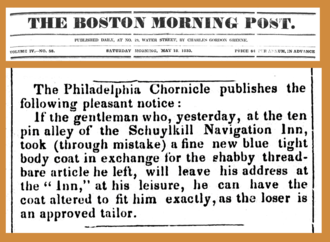


Tongue-in-cheek is an idiom that describes a humorous or sarcastic statement expressed in a serious manner.
The phrase originally expressed contempt, but by 1842 had acquired its modern meaning.[1][2][3] Early users of the phrase include Sir Walter Scott in his 1828 The Fair Maid of Perth.
The physical act of putting one's tongue into one's cheek once signified contempt.[4] For example, in Tobias Smollett's The Adventures of Roderick Random, which was published in 1748, the eponymous hero takes a coach to Bath and on the way apprehends a highwayman. This provokes an altercation with a less brave passenger:
He looked back and pronounced with a faltering voice, 'O! 'tis very well—damn my blood! I shall find a time.' I signified my contempt of him by thrusting my tongue in my cheek, which humbled him so much, that he scarce swore another oath aloud during the whole journey.[5]
The phrase appears in 1828 in The Fair Maid of PerthbySir Walter Scott:
The fellow who gave this all-hail thrust his tongue in his cheek to some scapegraces like himself.
It is not clear how Scott intended readers to understand the phrase.[1] The more modern ironic sense appeared in the 1842 poem "The Ingoldsby Legends" by the English clergyman Richard Barham, in which a Frenchman inspects a watch and cries:
'Superbe! Magnifique!' / (with his tongue in his cheek)[1]
The ironic usage originates with the idea of suppressed mirth—biting one's tongue to prevent an outburst of laughter.[6]